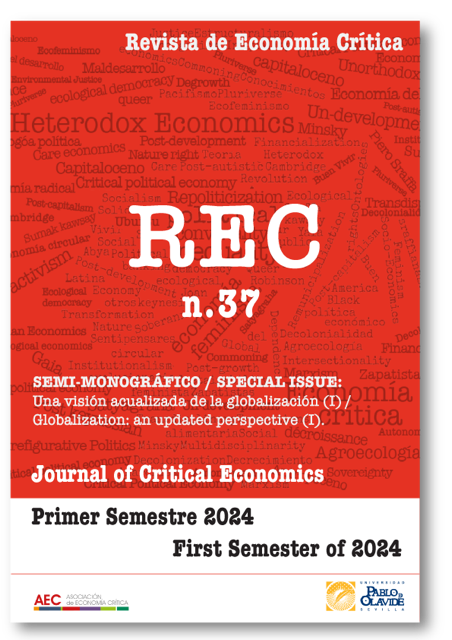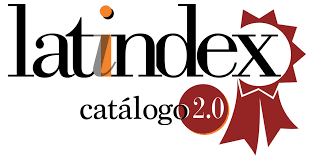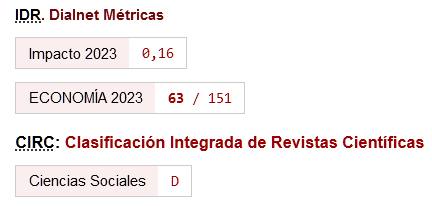Efectos y desafíos de la automatización y la digitalización. Parte II, consecuencias y problemas derivados de la digitalización
DOI:
https://doi.org/10.46661/rec.10701Palabras clave:
Digitalización, Automatización, Revolución industrial, industria 4.0, trabajo empleo y organización del trabajoResumen
En la primera parte de esta contribución se ha ofrecido una actualización de los trabajos que han estudiado los efectos que está teniendo la automatización y la digitalización sobre el empleo. En esta segunda parte se pretende llamar la atención sobre ciertas consecuencias problemáticas, en el presente y en el futuro, a las que da lugar la digitalización, en particular la Inteligencia Artificial, en una variedad de campos: los efectos sobre la productividad; una desigualdad creciente; la aparición de brechas digitales; los costos ambientales de la automatización y la digitalización; el impacto en los sistemas tributarios; y los peligros y riesgos, tanto en el sector privado como en el público, de la enorme cantidad de datos personales recopilados y su uso, llenando un vacío en la literatura al ofrecer una perspectiva más amplia e integrada sobre el tema.
Descargas
Citas
Abrardi, Laura; Cambini, Carlo; Rondi, Laura (2022): "Artificial intelligence, firms and consumer behavior: a survey". Journal of Economic Surveys. V.36, i4, September. 969-991. https://doi.org/10.1111/joes.12455
Acemoglu, Daron; Restrepo, Pascual (2019): The Wrong Kind of AI? Artificial Intelligence and the Future of Labor Demand. NBER Working Paper 25682. https://doi.org/10.3386/w25682
Acemoglu, Daron (2021): Harms of AI. National Bureau of Economic Research. Working Paper 29247 - September. https://doi.org/10.3386/w29247
Aghion, Philippe; Antonin, Celine; Bunel, Simon (2019): "Artificial Intelligence, Growth and Employment: The Role of Policy". Economie et Statistique / Economics and Statistics, Nº. 510-511-512. 149-164. https://doi.org/10.24187/ecostat.2019.510t.1994
Albarracín, Daniel (2022): "Controversias socioeconómicas sobre la tecnología. ¿Una nueva onda larga expansiva gracias a la revolución digital?". Revista Internacional de Pensamiento Político. I época, vol. 17, 435-456. https://doi.org/10.46661/revintpensampolit.6810
Allen, Robert C. (2009): "Engels' pause: Technical change, capital accumulation, and inequality in the British industrial revolution". Explorations in Economic History. V46, n4. 418-435.Allen, Robert C. (2017): "Lessons from history for the future of work". Nature. Vol. 550, 19 October. 321-324. https://doi.org/10.1038/550321a
Alston, Philip (2019): Digital technology, social protection and human rights: Report. United Nations. General Assembly at its 74th session. A/74/493. https://www.ohchr.org/en/calls-for-input/2019/digital-technology-social-protection-and-human-rights-report.
Aragón, Jorge: "Las brechas digitales, el derecho a la conexión y al conocimiento digital". Gaceta Sindical: reflexión y debate. Nº 36. 193-215.
Arntz, Melanie; Gregory, Terry; Zierahn, Ulrich (2016): The Risk of Automation for Jobs in OECD Countries: A Comparative Analysis. OECD Social, Employment and Migration Working Papers, No. 189, OECD Publishing, Paris. http://dx.doi.org/10.1787/5jlz9h56dvq7-en.
Bellver, José (2018): "Costes y restricciones ecológicas al capitalismo digital". Papeles de relaciones ecosociales y cambio global. FUHEM. N.º 144. 59-77.
Busemeyer, Marius R.; Kemmerling, Achim; Marx, Paul; Van Kersbergen, Kees Eds. (2022): Digitalization and the Welfare State. Oxford University Press. https://doi.org/10.1093/oso/9780192848369.001.0001
Calderón, Daniel; Casas, Belén; Urraco, Mariano; Revilla, Juan Carlos (2020): "The labour digital divide: digital dimensions of labour market segmentation". Work, organization, labour & globalisation. Vol. 14, nº 2. 7-30. https://doi.org/10.13169/workorgalaboglob.14.2.0007
Carbonero, Francesco; Scicchitano, Sergio (2021): Labour and technology at the time of Covid-19. Can artificial intelligence mitigate the need for proximity? GLO Discussion Paper, No. 765, Global Labor Organization (GLO), Essen.
Cazes, Sandrine (2023): "Social dialogue and collective bargaining in the age of artificial intelligence". OECD Employment Outlook 2023. OECD Publishing, Paris. 221-256. https://doi.org/10.1787/c35af387-en
Chiarella, Agustin; Martín, Gregorio; Ortega, Andrés; Szenkman, Paula (2022): Towards a global agenda for digitalization without greenhouse emissions. Real Instituto Elcano. Policy Brief. T20 Indonesia 2022. October 19.
Clifton, Judith; Glasmeier, Amy; Gray, Mia (2020): "When machines think for us: the consequences for work and place". Cambridge Journal of Regions, Economy and Society. Vol. 13, March. 3-23. https://doi.org/10.1093/cjres/rsaa004
Collington, Rosie (2022): "Disrupting the Welfare State? Digitalisation and the Retrenchment of Public Sector Capacity." New Political Economy. Vol. 27, nº 2. 312-328. https://doi.org/10.1080/13563467.2021.1952559
Consejo Económico y Social (2021): Informe 01/2021. La digitalización de la economía. Actualización del Informe 3/2017. Madrid, marzo.
Craglia, Max (ed.) (2018): Artificial Intelligence. A European Perspective. EUR Publications Office. Luxemburg. Joint Research Centre, JRC113826.
Dauvergne, Peter (2022): "Is artificial intelligence greening global supply chains? Exposing the political economy of environmental costs." Review of International Political Economy. Vol.29, n3. 696-718. https://doi.org/10.1080/09692290.2020.1814381
Dervis, Kemal; Qureshi, Zia (2016): The productivity slump - fact or fiction: the measurement debate. Global Economy and Development. Brookings Institution Brief, August.
Drahokoupil, Jan; Piasna, Agnieszka (2022): "Internet and Platform Work in Europe". In Busemeyer, M.R.et al.. 255-273. https://doi.org/10.1093/oso/9780192848369.003.0014
Dyer-Witheford, Nick; Mikola Kjosen, Atle; Steinhoff, James (2019): Inhuman Power. Artificial Intelligence and the Future of Capitalism. Pluto Press. London. https://doi.org/10.2307/j.ctvj4sxc6
Eubanks, Virginia (2021): Automating Inequality. How High-Tech Tools profile, Police, and Punish the Poor. St Martin's Press. New York.
Fanti, Lucrezia; Guarascio, Dario; Moggi, Massimo (2022): "From Heron of Alexandria to Amazon's Alexa: a stylized history of AI and its impact on business models, organization and work". Journal of Industrial and Business Economics. August. https://doi.org/10.1007/s40812-022-00222-4
Figueroa, Víctor (2019): "¿Hacia el fin del trabajo? Mitos, verdades y especulaciones". Nueva Sociedad. Nº 279, enero-febrero. 49-61.
Fundació Ferrer i Guardia (2022): Encuesta brecha y capacitación digital en España. Presentación de resultados. Diciembre.
Gelepithis, Margarita (2022): "The Politics of Tax Policy in the Digital Age". In Busemeyer, M.R.et al.. 355-370. https://doi.org/10.1093/oso/9780192848369.003.0020
Gmyrek, P.; Berg, J.; Bescond, D. (2023): Generative AI and jobs: A global analysis of potential effects on job quantity and quality. International Labour Organization. ILO Working Papers, 96. August. https://doi.org/10.54394/FHEM8239
Green, A.; Salvi del Pero, A.; Verhagen, A. (2023): "Artificial intelligence, job quality and inclusiveness". OECD Employment Outlook 2023. OECD Publishing, Paris. 128-154. https://doi.org/10.1787/99c4c123-en
Hacker, Philipp (2023): The European AI Liability Directives. Critique of a Half-Hearted Approach and Lessons for the Future. SSRN-id4279796. Working Paper version 20 January. https://doi.org/10.2139/ssrn.4279796
Hatzius, Jan; Briggs, Joseph; Kodnani, Devesh; Pierdomenico, Giovanni (2023): The Potentially Large Effects of Artificial Intelligence on Economic Growth. Goldman Sachs Economic Research. March 26.
Hill, Linda A.; Le Cam, Ann; Menon, Sunand; Tedars, Emily (2022): Digital Transformation: A New Roadmap for Success. Harvard Business School. Working Knowledge. https://hbswk.hbs.edu/item/leading-in-the-digital-era-a-new-roadmap-for-success. 7 February.
Kalluri, Prayusha (2022): "Don't ask if AI is good or fair, ask how it shifts power". Nature. Vol. 583. 9 July 2020. 169. https://doi.org/10.1038/d41586-020-02003-2
Lai, John; Widmar, Nicole O. (2021): "Revisiting the Digital Divide in the COVID-19 Era". Applied Economic Perspectives and Policy. V. 43, nº 1. 458-464. https://doi.org/10.1002/aepp.13104
Lane, Marguerita; Saint-Martin, Anne (2021): The impact of Artificial Intelligence on the labour market: What do we know so far? OECD Social, Employment and Migration Working Papers. Nº 256. DELSA/ELSA/WD/SEM (2021)3.
Lane, Marguerita; Williams, Morgan; Broecke, Stijn (2023): The impact of AI on the workplace: Main findings from the OECD AI surveys of employers and workers. OECD Social, Employment and Migration Working Papers, nº 288. DELSA/ELSA/WD/SEM (2023)6.
Lange, Steffen; Pohl, Johanna; Santarius, Tilman (2020): "Digitalization and energy consumption. Does ICT reduce energy demand?" Ecological Economics. Vol. 176, October. https://doi.org/10.1016/j.ecolecon.2020.106760
Lazonick, William; Mazzucato, Mariana (2013): "The risk-reward nexus in the innovation-inequality relationship: who takes the risks? Who gets the rewards?" Industrial and Corporate Change. v.22: 1093-1128. https://doi.org/10.1093/icc/dtt019
Linares, Pedro J.; López, Vicente (2016): "La economía circular versus la economía digital ¿dónde está la revolución?" Gaceta Sindical, reflexión y debate. Nueva etapa nº 27, dic. 229-242.
Mahnkopf, Birgit (2019): The '4th wave of industrial revolution' - a promise blind to social consequences, power and ecological impact in the era of 'digital capitalism. Euro-Memo Group. Discussion Paper nº 1/2019.
Mishel, Lawrence (2022): "How automation and skill gaps fail to explain wage suppression or wage inequality." Industrial and Corporate Change. Vol 31, n1. 269-280. https://doi.org/10.1093/icc/dtac004
OECD (2019): Under Pressure: The Squeezed Middle Class. OECD Publishing, Paris.
OECD (2020): Tax Challenges Arising from Digitalization - Economic Impact Assessment. Inclusive Framework on BEPS. OCDE/G20 Base Erosion and Profit Siftting Project. OCDE Publishing, Paris.
Özkisiltan, Didem; Hassel, Anke (2020): Humans versus Machines: An Overview of Research on the Effects of Automation of Work. Hertie School of Governance. https://doi.org/10.2139/ssrn.3789992
Parolin, Zachary (2019): Automation and Occupational Wage Trends: What Role for Unions and Collective Bargaining? Luxembourg Income Study (LIS) Working Paper Series, No. 767.
Piasna, Agnieszka (2020): Counting gigs. How can we measure the scale of online platform work? European Trade Union Institute. Working Paper 2020.06. https://doi.org/10.2139/ssrn.3699350
Ponce del Castillo, Aida (2022): "Artificial intelligence: filling the gaps". Social Europe. 14th April 2022.
Ragnedda, Massimo (2017): The Third Digital Divide: A Weberian Approach to Digital Inequalities. Nueva York. Routledge. https://doi.org/10.4324/9781315606002
Raventós, Daniel (2021): La renta básica. ¿Por qué y para qué? Los libros de la Catarata. Madrid.
Recio, Albert (2018): "Digitalización y trabajo: notas para un debate". Papeles de relaciones ecosociales y cambio global. FUHEM. Nº 144. 49-28.
Salvi del Pero, Angelica; Wyckoff, Peter; Vourc'h, Ann (2022): Using Artificial Intelligence in the workplace: What are the main ethical risks? OECD Social, Employment and Migration Working Papers, Nº 273. DELSA/ELSA/WD/SEM (2022)7.
Several Authors (2022): Libro Blanco sobre la reforma tributaria. Instituto de Estudios Fiscales, Madrid. https://www.ief.es/Investigacion/Com_LibroBlanco.vbhtml.
Soete, Luc (2018): "Destructive creation. Explaining the productivity paradox in the digital age." En Neufeind, Max; O'Reilly, Jacqueline; Ranft, Florian (Eds.). Work in the digital age. Challenges of the Fourth Industrial Revolution. Rowman & Littlefield. London-New York. 29-46.
Schwab, Klaus (2016): The Fourth Industrial Revolution: what it means and how to respond. https://www.weforum.org/agenda/2016/01/the-fourth-industrial-revolution-what-it-means-and-how-to-respond/ Last access, 10 April 2019.
Schnabel, Isabel (2022): Speech by Isabel Schnabel, Member of the Executive Board of the ECB, at a panel on the "Fight against inflation, at the IV Edition Foro La Toja. La Toja (Spain), September 30. https://www.ecb.europa.eu/press/key/date/2022/html/ecb.sp220930~9dac17b1fe.en.html
Stansbury, Anna; Summers, Lawrence H. (2020): The Declining Worker Power Hypothesis: An explanation for the recent evolution of the American economy. National Bureau of Economic Research Working Paper 27193, May. https://doi.org/10.3386/w27193
Tørsløv, Thomas; Wier, Ludvig; Zucman, Gabriel (2020): The Missing Profits of Nations. Mimeo, January 15. https://missingprofits.world/ Last access, 9 April 2020. It is an updated version of the document with the same title published by the National Bureau of Economic Research, Working Paper 24701, June 2018. https://doi.org/10.3386/w24701
UK Parliament (2022): Energy Consumption of ICT. POSTNote, number 677, September.
United Nations (2020): Report of the Secretary-General. Roadmap for Digital Cooperation. June.
Urzì, Maria Cesira; Curtarelli, Mauricio; Baiocco, Sara (2022): How digital technology is reshaping the art of management. European Commission, Seville, Spain. Joint Research Centre. WP series 2002/05, JRC13808.
Utterback, James M. (2001): Mastering the Dynamics of Innovation. Harvard Business Review Press, second edition, 1996. I have used the Spanish version, Dinámica de la innovación tecnológica. Fundación Cotec para la Innovación Tecnológica. Madrid.
Van Dijk, Jan (2020): The Digital Divide. Cambridge UK. Polity Press. 2020.
Van Dis, Eva A.; Bollen, Johan; van Rooij, Robert; Zuidema, Willem; Bockting, Claudi L. (2023): "ChatGPT: five priorities for research". Nature. Vol. 614, February, 224-226. https://doi.org/10.1038/d41586-023-00288-7
Van Parijs, Philippe; Vanderborght, Yannick (2017): Basic Income. A Radical Proposal for a Free Society and a Sane Economy. Harvard University Press. https://doi.org/10.4159/9780674978072
Warning, Anja; Weber, Enzo; Püffel, Anouk (2022): "On the Impact of Digitalization and Artificial Intelligence on Employers' Flexibility Requirements in Occupations-Empirical Evidence for Germany". Frontiers in Artificial Intelligence. May. https://doi.org/10.3389/frai.2022.868789
Wren, Anne (2022): "Digitalization and the Transition to Services". In Busemeyer, M.R.et al. 41-63. https://doi.org/10.1093/oso/9780192848369.003.0003
Zuboff, Shoshana (2020): The Age of Surveillance Capitalism. Public Affairs. London.
Descargas
Publicado
Cómo citar
Número
Sección
Licencia
Derechos de autor 2024 Revista de Economía Crítica

Esta obra está bajo una licencia internacional Creative Commons Atribución 4.0.
Esta licencia permite a terceros compartir (copiar y redistribuir el material en cualquier medio o formato) y adaptar (remezclar, transformar y crear a partir del material para cualquier finalidad, incluso comercial), siempre que se reconozca la autoría y la primera publicación en esta revista (La Revista, DOI de la obra), se proporcione un enlace a la licencia y se indique si se han realizado cambios en la obra.







